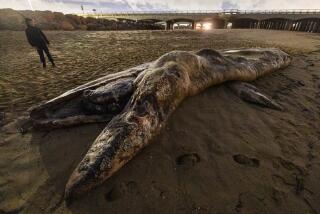Dolphins are being stranded on O.C. beaches, and it could be due to rain runoff

Dolphins are being stranded on Orange County beaches, possibly due to recent storm runoff.
At least six dolphins have become stranded on beaches in Orange County this month, an unusually high number that has left animal rescuers puzzled.
The Pacific Marine Mammal Center said in a news release Monday it is working with scientists to figure out what’s causing the dolphins to suddenly wash ashore in such high numbers, but the organization said one potential cause is recent storms that can make ocean water toxic.
The series of beached dolphin rescues began Feb. 4, when the organization found three common dolphins in Huntington and Laguna beaches. Two of the dolphins had to be euthanized, the organization said. On Feb. 10, a dead bottlenose dolphin was found at Corona Del Mar. Five days later, a dead common dolphin was found there. Both were pregnant.
The most recent stranding the animal rescuers responded to was last week, also in Corona Del Mar. Two more beached dolphins were reported in the same time frame, but one washed back out to the ocean and another washed up in a location that was unsafe for rescuers to respond to, the organization said.
The same time last year, the organization only responded to one stranded dolphin, according to the news release. Seals and sea lion rescues have also increased significantly this season compared to the same time last year, the organization said.
Necropsies have been performed on all the dolphins and the Pacific Marine Mammal Center is working with the National Oceanic and Atmospheric Administration and universities across the U.S. to get to the bottom of what’s causing the cetaceans to wash ashore.
Causes could include viral infections, bacterial infections or toxins, said Kristen Sakamaki, a veterinarian with the marine mammal organization. Potential culprits include poisonous toxins released by recent algae blooms along the Southern California Coast, which can produce domoic acid and be harmful to humans, marine mammals and seabirds when ingested, according to a news release.
Recent heavy rains may also be to blame. The rain runoff from the land can result in excess nutrients and harmful toxins in the ocean, the organization said. But officials won’t know the real answer until their studies and the necropsies are complete.
Officials warned the public that the marine mammals can carry zoonotic diseases that can be transmitted to pets and humans, especially young children. Attempting to push beached marine mammals back into the ocean “may actually be doing more harm than good.”
Anyone who sees a stranded marine mammal can call the organization at (949) 494-3050.
alejandra.reyesvelarde@latimes.com
Twitter: @r_valejandra
More to Read
Start your day right
Sign up for Essential California for news, features and recommendations from the L.A. Times and beyond in your inbox six days a week.
You may occasionally receive promotional content from the Los Angeles Times.







